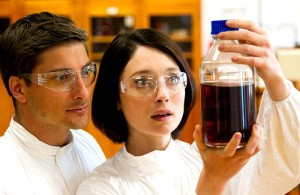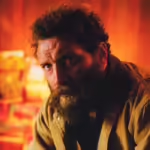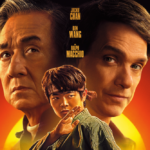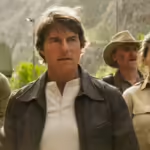Having worked behind the scenes in Peter Jackson’s WETA Digital on some of contemporary cinemas biggest blockbusters, David Gould made the courageous decision to leave his job and embark on telling his own stories. His first feature-length project, The Cure, tackles the subject of secrecy within pharmaceutical companies and the conflict between saving lives and making money. An action/thriller set almost entirely within the confines of a laboratory, The Cure has excellent pacing coupled with solid lead performances and a bravery to confront the controversial question – what if there was a cure for cancer, and pharmaceutical corporations were hiding it for financial gain?
TOM: The Cure is about a young woman discovering the company she’s working for has been hiding the cure for cancer – I’m aware that is actually a conspiracy in real life as well – is that where the inspiration for the film came from?
David: The real inspiration was my mother, she had bowel cancer and passed away from it. It was that time that she’d done surgery and been through all the typical medical procedures that could be done and there was no hope at that point so I looked for alternative medicine and tried different things. It got to the point where she did pass away and it created that ‘what if’ question. ‘What if’ there was something that I missed, that had been hidden or kept secret. But then when I started to write and research the script, it was then I realized about other medicines that had been squashed or quelled by big pharmaceutical companies because they were made from natural products and therefore they couldn’t patent them. That’s when it started to open up the reality about what it is that could possibly be out there. And then further research about the way pharmaceutical companies work and how they’re beholden to stockholders, shares, and how it’s more about that.
TOM: Were you surprised about the amount of information that you uncovered when undertaking the research?
David: Yeah absolutely. For example Dichloracetate which is a product in Canada that people wanted to continue or try to research – again it’s a natural product and can’t be patented. There’s avenues like that, and I’m sure there are more that could be researched if they wanted to pursue it.
TOM: Certainly food for thought.
David: We think about money spent on cancer research, not even on a private level – on a government and international level – you wonder whether the money’s being spent in the right way. The big pharmaceutical companies lobbying the government and so on have a certain degree of control.
TOM: There is so much information and so many unanswered questions to choose from – does The Cure focus on one particular aspect of what we’ve discussed or does it really ask the broad questions?
David: It’s kind of big and broad – it was a conscious choice to have the film sit in the genre of action/thriller, it couldn’t really spend half the film explaining the science that lead to that. It was interesting because the first time I sat down to write the script it took me maybe 10-15 drafts where she was actually finding the cure for cancer and what that would mean, and what the process and procedures would be. But each time it came back to that same thing – it’s an action/thriller and we have to keep it moving, and it’s slow when we keep going into the scientific elements. Basically in the film we see the molecules and a little bit of that research but we don’t explain how. It’s more of the larger concept – they’ve had it, why have they kept it hidden for so long. The focus was more on her journey.
TOM: You’ve primarily worked in VFX on blockbusters such as King Kong and The Lord Of The Rings franchise – what triggered you to go into writing/producing/directing and make your own work?
David: It was interesting because I’d done Lord of the Rings, Two Towers, King Kong, big visual effects films, and in my career I could move up to become a Visual Effects Supervisor or some role like that but I really had a burning desire to start making my own films. That was driven in some way by being in the visual effects industry – with the visual effects extravaganza the story isn’t really an important part of it and its more about the boom and the crash and the one hundred robots or whatever it may be. If I’m going to make films, it’s going to be getting back to the basics of cinema. Getting back to the characters, great storytelling, characters that you really care about. When people are firing guns and throwing grenades at them, you care. While there is action elements in [The Cure], you’ll see how there’s the underlying characters and what they’re dealing with. For example she’s a bio-chemist but her father died from cancer when she was young which is the driving reason for her to want to find a cure. So when she has it she thinks ‘what would have happened if I had it before he died.’ She’s dealing with those emotional things and I think it’s something a lot of people had dealt with so it’s a topic that I think everyone can relate to, how to deal with the frustration.
TOM: Is it hard to produce indie films in New Zealand when you have the WETA production house next door?
David: It’s actually easier. You have this situation where you’ve got this crew who have well paid jobs for an extended period, and when they stop working on one of those films they are in a position where they can come and help you because they have their own financial savings. For example on The Cure there were a whole bunch of people who came from Peter Jackson’s production company. We had for example Mark Ashton who was the 2nd AD on The Lord Of The Rings, the casting director, and other people who had worked in lower level roles who never got the chance to break through the structure of the studios and who were interested in taking on a bigger role. For them it wasn’t so much about the money as it was about the opportunity to step up.
TOM: I read that you’re self-distributing The Cure on Video on Demand and DVD because you don’t think it’s viable for independent films to chase a cinema release – what caused you to come to this opinion?
David: We have Cinetel films, they’re our international sales agent based in LA and they’re selling the film to a variety of countries – we’ve already sold it to nine countries. The self-distribution component of it is more to do with New Zealand and Australia. I retained those two territories for myself, I get the rights to do whatever I want with those two countries. The first thing the big distributors ask is ‘who’s in it’ – they want a big star that they can put on the poster and as a result when you don’t have the big names it’s a lot more difficult and your put in the ‘other’ basket. I think consumers tastes are changing. They don’t go to cinema as much. They don’t want to get in the car, hire a babysitter, they’ll happily watch it on their home TV – they’ve got big surround sound systems and LCD TV’s. Some people just like to watch films on their iPad. That’s what I wanted to do with releasing it on VOD, DVD and pay TV, because if there’s some way that you want to see the film you don’t have to be beholden to having to go to a cinema at 2:30pm to watch it. There’s also that sense with the audience of immediacy – I hear about it, I want to watch it now. We don’t want to limit them in that because that then creates piracy issues.
TOM: We’re watching a concept trailer for your next film Brotherhood tonight – can you tell me any more information about your upcoming projects?
David: Interestingly about a year ago I took the concept to LA and pitched the basic idea. I had eleven projects and that was the one that made everyone in the meetings eyes and ears prick up and be interested. We went back the following year having written the script and prepared this concept trailer and from that I had 36 meetings in 7 days – it was amazing I met with Disney and Fox. It’s a bigger project, one sales agent called it ‘The Da Vinci Code on steroids’. It’s an action/adventure film that begins in the crusades. There’s a bunch of knights who have been tasked by the pope to go to this particular place and collect a page – they don’t know what’s on it, but it’s actually a page from the bible that they’ve wanted to keep hidden because it’s from the Book of Revelations and has a prophecy that will come true in the future and affect all of mankind. The church wants to protect that secret because it will maintain power for them. These knights keep the page and then 700 years later…only ten minutes of the film is in the crusades, the majority of the film happens now.
The Cure was screened as part of the Gold Coast Film Festival: April 3rd-13th
David will be speaking about The Cure at the Gold Coast Arts Centre on the 8th of April.




